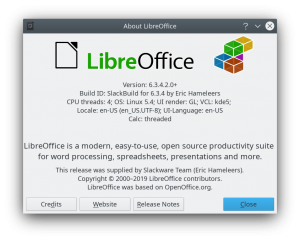![]() Due to the Corona (COVID-19) crisis, Google decided to postpone the introduction of Chromium 81 to the stable channel. Understandably due to the challenges created by sending most developers home for their own safety and protection, which is a cause for less efficient work schedules.
Due to the Corona (COVID-19) crisis, Google decided to postpone the introduction of Chromium 81 to the stable channel. Understandably due to the challenges created by sending most developers home for their own safety and protection, which is a cause for less efficient work schedules.
Instead, there is an increased focus on addressing security related issues in Chromium 80 and releasing those in rapid succession. After all, any crisis attracts the worst of humankind to mess with the more gullible part of the population and browser based phishing and hack attempts are on the rise.
And so, yesterday there was another version upgrade, and I built the new chromium packages for Slackware 14.2 and -current already. The chromium-80.0.3987.149 release can be downloaded from any mirror – or upgraded using slackpkg/slackpkg+ if you use that.
 In addition, new LibreOffice packages are available for Slackware -current.
In addition, new LibreOffice packages are available for Slackware -current.
You’ll get the latest and greatest ‘fresh’ release of 6.4.2 and unfortunately, no new packages for Slackware 14.2. I am unable to compile the 6.3 or 6.4 releases on the stable version of Slackware due to outdated/obsoleted libraries.
Note: among the packages for LibreOffice that are targeting Slackware-current, you will find a “libreoffice-kde-integration” package which adds Qt5 and KDE5 (aka Plasma5) support to the LibreOffice suite.
If you run Slackware-current but do not have KDE5 packages installed at all, don’t worry. LibreOffice will work great – the KDE integration package just will not add anything useful for you. On the other hand, if you have Plasma5 installed you will benefit from native file selection dialog windows and other integration features. And even if you do not have Plasma5 but you do have Qt5 installed, then you will be able to run LibreOffice with Qt5 User Interface elements instead of defaulting to GTK3.
If you want to compile LibreOffice 6.4.2 packages yourself using my SlackBuild script, then be aware that by default the KDE5 support is disabled. You will have to set the value of the script parameter “ADD_KDE5” to “YES”. Additionally you will have to install the packages that this functionality depends on otherwise the compilation will fail.
Read the ‘README.kde5‘ file in the source directory for the list of packages you’ll need. All of the required packages can be found in my ‘ktown’ repository: https://slackware.nl/alien-kde/current/latest/
Enjoy! Eric

Recent comments